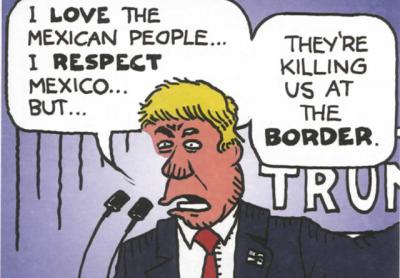Trump: An Impartial Appraisal of the Nominee

Just seven months after he discussed and signed copies of “Bernie,” a graphic biography of Senator Bernie Sanders of Vermont, at the Amagansett Library, Ted Rall, a political cartoonist, graphic novelist, and author known for his intensely critical view of the American government, offers “Trump,” a similar presentation of the Republican Party’s nominee for president.
Mr. Rall will return to the library on Aug. 4 at 6 p.m. to discuss his latest work, in which he impartially presents Donald Trump’s life, leaving the reader to assess the man and his candidacy. As with all of its authors events, reservations have been recommended by calling the library.
“I thought he was going to win the day he announced,” Mr. Rall, who lives in East Hampton, said of Mr. Trump last week. “He had so much name recognition, and came out in this massive field that kept growing. If you’re polling 30 percent in a field of 12, much less 18, you’re going to win. They threw me out of engineering school, and I could figure that out.”
While both “Bernie” and “Trump” are similar in form, Mr. Rall was clearly a proponent of Mr. Sanders’s insurgent campaign. He is just as clearly disdainful of a Democratic Party he sees as having drifted far right and into the embrace of corporate interests. He remains a staunch opponent of Hillary Clinton, whom her party nominated for president last Thursday. “I can’t vote for Hillary,” he said, “because she is a reprehensible person, and, first and foremost, because of the blood of Iraqis and Libyans and Syrians whose deaths she is in part responsible for. That cries too loud for justice to ignore.”
Mr. Rall, a former resident of New York City, is just as plainly opposed to Mr. Trump’s candidacy, yet writes of him with a certain detachment. “Trump’s rallies were very entertaining,” he writes. “They were also scary. The candidate’s sweeping, vague pronouncements and violent tone were reminiscent of Hitler’s rallies at Nuremberg, minus the awesome choreography.” And, “Trump’s supporters loved him. But they caught flak from their friends. When they heard themselves described as fascist or racist, they didn’t recognize themselves.”
The book “will tell you everything you need to know,” Mr. Rall said, chiefly that Mr. Trump’s followers “are not all morons and rubes. They’re responding to something real. Also, there’s a tradition of nativism, xenophobia, and racism in this country and has been in the Republican Party for a long time.” Also, “One can find a lot about his character in the way he conducts his business.”
This is presented in the retelling of the candidate’s career as a developer in New York City. Mr. Trump purchased the Barbizon Plaza on Central Park South in 1981. Intending to demolish it, he quickly set to work harassing and terrorizing its tenants in the hope that they would move out. The year before, he’d hired illegal immigrants to demolish the Bonwit Teller building on Fifth Avenue, paying them “slave wages,” Mr. Rall writes, if he paid them at all. “Trump was an equal-opportunity asshole. He screwed over banks at least as often as impoverished day laborers.”
But Mr. Trump’s supporters apparently do not care. “Everyone in New York knew it,” Mr. Rall said of this history, “but it came and went because of the short attention span of Americans.”
Mr. Rall cites his former professor at Columbia University, Robert Paxton, author of “The Anatomy of Fascism” and “Vichy France: Old Guard and New Order, 1940-1944,” to draw parallels between Mr. Trump and some of the 20th century’s most hated villains, but also to explain his appeal. Trump, said Mr. Paxton, “has an instinct for fears and anger out in the public and he matches up with them perfectly. . . . He’s very spontaneous and has a genius for sensing the mood of a crowd, and I think to some degree Hitler and Mussolini had those qualities also.”
Despite the damning demonstration of Mr. Trump’s character, Mr. Rall allows the reader to decide. “This is about the failure of the two-party system,” he writes in an afterword. “There’s still lots of lingering pain from the 2007-2008 economic crisis.” If Mr. Trump wins the presidency, “we are about to embark on a remarkable experiment.”
“With him, anything is possible, including very bad alternatives,” Mr. Rall said. “People are certainly right to be concerned and worried. But my task was to present a biography that shed light on a subject, almost like a voter guide . . . you be the judge.”
